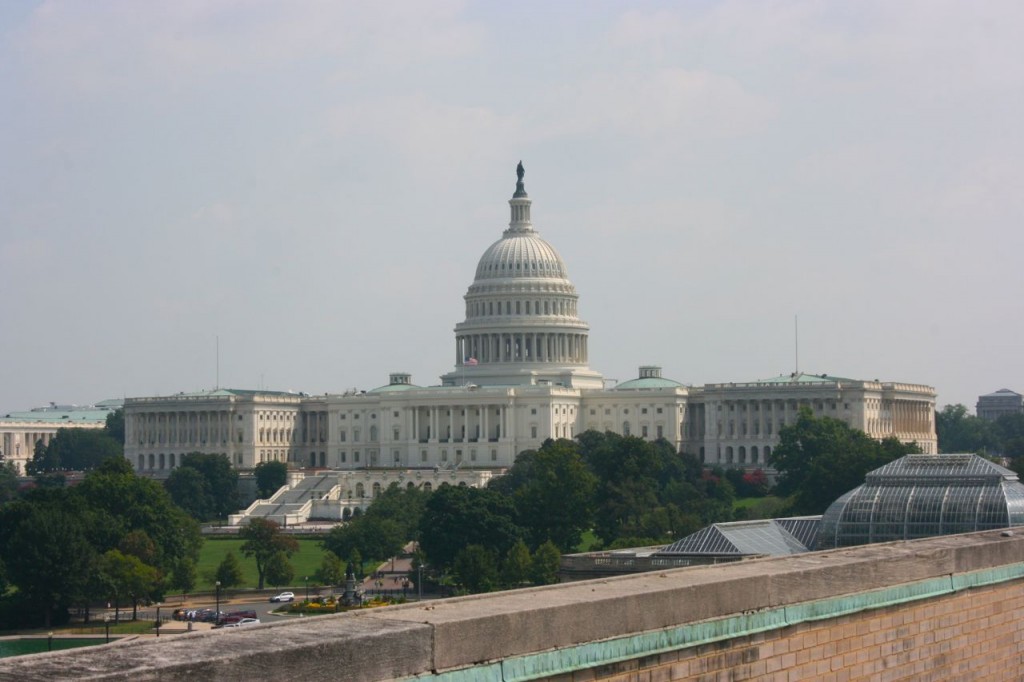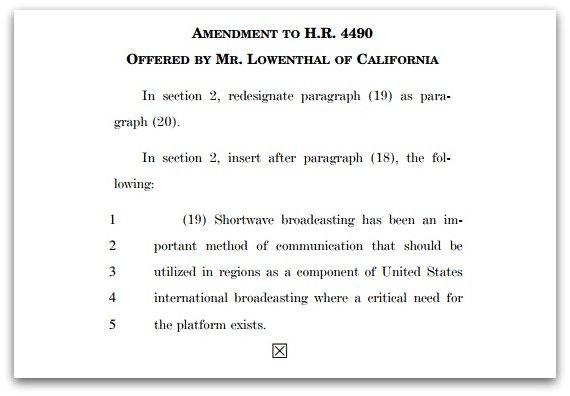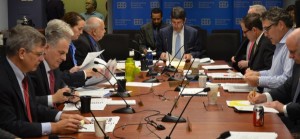One of those changes will be the formation of a special committee to examine “the efficacy of shortwave radio transmissions.”
WASHINGTON, DC – As a new member joined its ranks, the Broadcasting Board of Governors today announced a series of restructuring efforts to improve the way the bipartisan board operates.
“The work this agency does is vital, and we must do everything in our power to make sure we as a Board are doing the best we can – not only for our employees, but for the millions of people who depend on the news and information our networks provide,” said the Board’s chair, Jeff Shell.
Shell introduced and welcomed to the Board Kenneth Weinstein, who was confirmed by the Senate in September and sworn in on October 18. He also welcomed Assistant Secretary of State for Public Affairs Douglas Frantz, who was designated by Secretary of State John Kerry – a BBG board member – to represent him at today’s meeting.
Among the changes that the Board adopted is a simplified structure that includes an Advisory Committee and special committees focused on specific strategic issues. Two such special committees were immediately established – one dedicated to defining the responsibilities of and initiating a search for a Chief Executive Officer of U.S. international broadcasting and another to examining the efficacy of shortwave radio transmissions. The Advisory Committee is made up of Governors Shell, Armstrong, Meehan and Weinstein. Governors Shell, Armstrong, McCue, and Weinstein will serve on the Special Committee on the Creation of a CEO, while Governors Armstrong, Crocker, Meehan, and Weinstein now constitute the Special Committee on Shortwave Broadcasting.
With this meeting, the Board began using a consent agenda to adopt items of business that are non-controversial or routine. From now on, Board members will consider and vote on items of business as a group, though any member can request that an agenda item be considered separately. The use of the consent agenda, as well as a revised Board travel policy that was also adopted, were among the recommendations of the Office of Inspector General in its January 2013 inspection report.
The Board also announced the selection of Paul Kollmer-Dorsey as the agency’s General Counsel. Kollmer-Dorsey joined the BBG as Deputy General Counsel and Acting General Counsel in June 2009. Prior to joining BBG, he served as Senior Vice President, General Counsel and Corporate Secretary of Global Relief Technologies and worked for a dozen years in the international satellite communications industry. He earned his law degree from the Stanford School of Law.
And after three years with the BBG and decades of distinguished public and private sector service, International Broadcasting Bureau Director Richard Lobo announced his retirement, effective on November 30. Board members expressed their gratitude for his service and leadership during a period of budgetary challenges.
“The agency and, in fact, the country owes Dick a debt of gratitude for what he did at the IBB,” Shell said. “Dick was instrumental in developing the proposal for establishing a CEO to streamline the agency as well as leadership of the IBB during a challenging period of uncertainty and tightening budgets.”
Lobo thanked Shell and the other Board members and read from the letter he had just sent to President Barack Obama: ”The proposed implementation of the plan, which I helped formulate, to create the position of CEO and to subsequently abolish the IBB Director’s position creates the ideal time for me to step aside. After more than five decades in broadcasting, I intend to retire and return to my native state of Florida.”
Turning to the latest events affecting U.S. international media, Shell acknowledged the hard work and sacrifice required of BBG employees during the partial government shutdown that ended on Oct. 17. Despite the furloughing of approximately 40 percent of the agency’s federal workforce, programs were produced and distributed around the world uninterrupted.
In addition to the administrative challenges of operating during the shutdown, Shell took time to acknowledge how in recent months, journalists across the BBG’s broadcast regions have been harassed, threatened, and wrongly detained as a result of their work.
The simple act of reporting on public demonstrations or events has brought physical attacks on a Radio Free Europe/Radio Liberty (RFE/RL) reporter and a Voice of America (VOA) reporter in Herat province of Afghanistan, the detainment and release of correspondents for RFE/RL in Astana and in Minsk, and the arrest and beating of a VOA correspondent in Angola.
In Iran, officials have continued harassment against VOA and Radio Farda journalists and their families, and in an attempt to intimidate the press and control coverage of elections, Azerbaijan’s ruling political party has targeted RFE/RL and VOA broadcasts with complaints of illegal electioneering.
The Board also called for the immediate release of Alhurra TV reporter Bashar Fahmi as well as other journalists being held incommunicado in Syria. Fahmi has not been seen or heard from since he went missing while reporting in Aleppo, Syria in August 2012.
“The people who make up this agency are some of the most dedicated, courageous and selfless people I have ever known,” Shell concluded. “No hardship, whether it is a partial government shutdown, or unjust incarceration can stop the good work of our workforce. And for that we thank you.”
The Board paused to pay tribute to two distinguished colleagues who recently passed away – Jack Payton, an esteemed and accomplished newsman and senior editor at VOA, and Dave Strawman, recently retired manager of the BBG transmitting station in Tinang, the Philippines.








